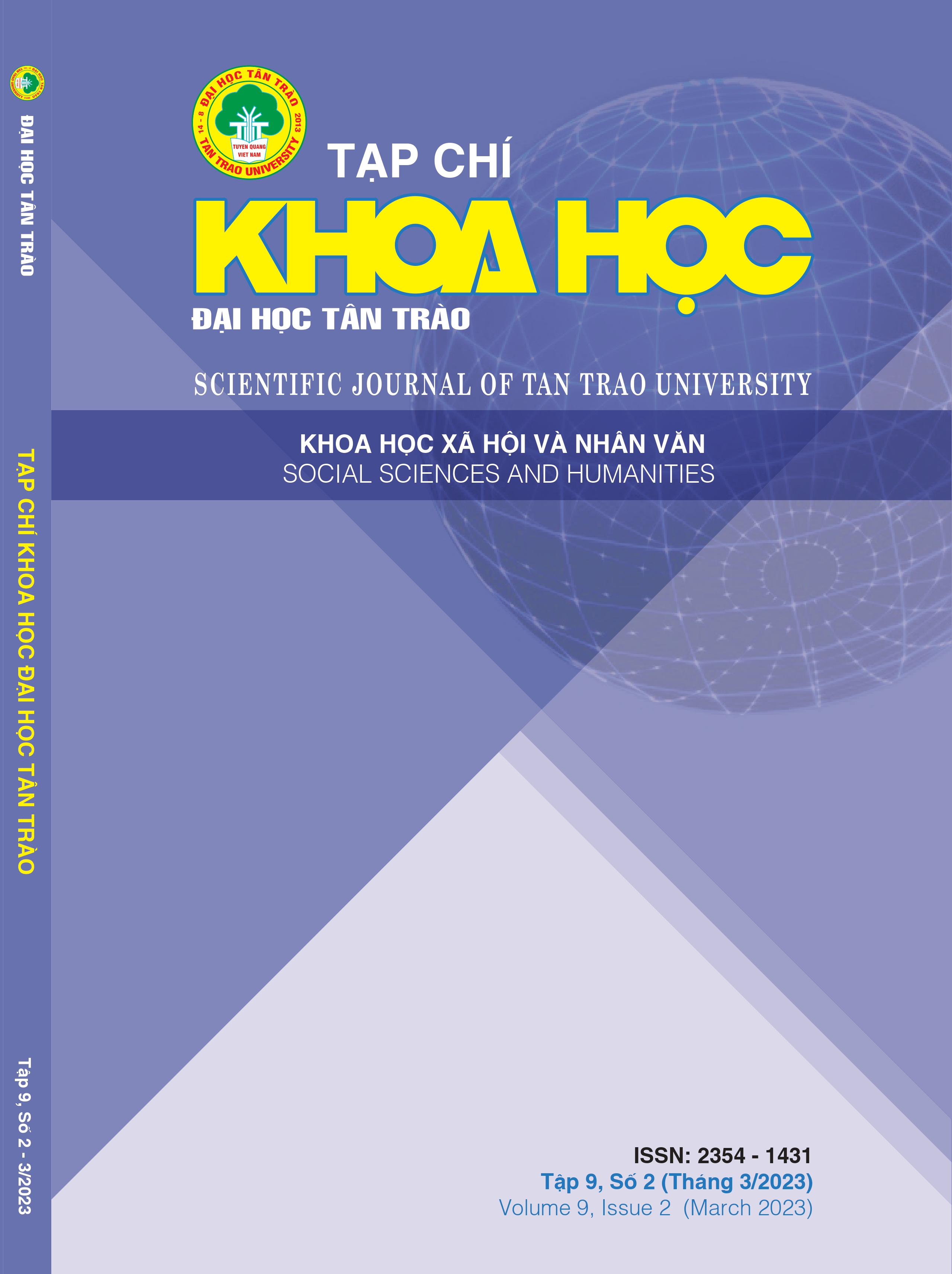THỰC TRẠNG VÀ GIẢI PHÁP XÂY DỰNG ĐỜI SỐNG VĂN HÓA CƠ SỞ Ở TỈNH THÁI BÌNH HIỆN NAY
DOI:
https://doi.org/10.51453/2354-1431/2023/926Từ khóa:
Văn hóa, đời sống văn hóa, Thái BìnhTóm tắt
Thái Bình là mảnh đất “địa linh nhân kiệt”, nơi hội tụ, lan tỏa các sắc thái văn hóa và có bề dày truyền thống lịch sử - văn hóa lâu đời, kết tinh nhiều giá trị văn hóa vật chất, tinh thần độc đáo. Trong thời gian qua, xây dựng đời sống văn hoá trên địa bàn tỉnh Thái Bình đã trở thành cuộc vận động văn hoá lớn có tác dụng tích cực, sâu sắc đến nhiều lĩnh vực của đời sống xã hội, làm thay đổi diện mạo và nâng cao đời sống văn hóa, tinh thần của nhân dân ở cơ sở, góp phần thực hiện thắng lợi các nhiệm vụ chính trị, kinh tế, văn hóa - xã hội. Tuy nhiên, trong quá trình thực hiện vẫn còn tồn tại những hạn chế xuất phát từ những nguyên nhân chủ quan và khách quan, vì vậy cần phải thực hiện đồng bộ nhiều giải pháp nhằm âng cao hơn nữa chất lượng xây dựng đời sống văn hóa ở cơ sở, góp phần thực hiện thắng lợi sự nghiệp đổi mới đất nước hiện nay của tỉnh Thái Bình
Tải xuống
Tài liệu tham khảo
[1] Ben N.C. (2010), Vietnamese culture in the context of international economic integration, Hanoi National Political Publishing House.
[2] Communist Party of Vietnam (2021), Documents of the 13th National Congress of Deputies, Volumes 1, 2, National Political Publishing House, Hanoi.
[3] Department of Culture, Sports and Tourism (2022), Report No. 15/BC-SVHTTDL on the results of 3 years of implementation and implementation of Resolution 04-NQ/TU dated January 30, 2019 of the Party Executive Committee province on strengthening education, promoting the cultural, cultural, patriotic and revolutionary traditions of Thai Binh homeland for cadres, party members and people of all classes.
[4] Hai D.S. (2014), Thai Binh Provincial Party Committee led the construction of new rural areas from 2008 to 2015, Master thesis on History of the Communist Party of Vietnam, Academy of Politics.
[5] Phu P.H. (Editor, 2016), Cultural development - the endogenous strength of the nation in the conditions of market economy and international integration, National Political Publishing House, Hanoi.
[6] Thai Binh Provincial People's Council (2017), Resolution No. 13/2017/NQ-HDND dated July 14, 2017 approving the master plan on the system of grassroots cultural and sports institutions in Thai Binh province up to 2020 towards 2030
[7] Thai Binh Provincial Party Committee (2019), Report No. 303-BC/TU, 10-year results of the implementation of the conclusion No. 51 - KL/TW, dated July 22, 2009 of the Politburo on "Continuing to implement Directive No. 27-CT/TW, dated 12/01/1998 of the Politburo on the implementation of a civilized lifestyle in weddings, funerals and festivals.
[8] Thai Binh Provincial Party Committee (2019), Report No. 290-BC/TU dated May 30, 2019 Summary of 5 years of implementation of Resolution No. 33-NQ/TW of the Party Central Committee on "building and developing Vietnamese culture and people meet the requirements of sustainable development of the country”
[9] Thai Binh Provincial People's Committee (2020), Report on the results of the movement "All people unite to build a cultural life" in 2020 and orientations and key tasks in 2021.
[10] Thai Binh province web portal. https://thaibinh.gov.vn/
Tải xuống
Đã Xuất bản
Cách trích dẫn
Số
Chuyên mục
Giấy phép

Tác phẩm này được cấp phép theo Giấy phép Quốc tế Creative Commons Attribution-ShareAlike 4.0 .
Bài báo được xuất bản ở Tạp chí Khoa học Đại học Tân Trào được cấp phép theo giấy phép Ghi công - Chia sẻ tương tự 4.0 Quốc tế (CC BY-SA). Theo đó, các tác giả khác có thể sao chép, chuyển đổi hay phân phối lại các bài báo này với mục đích hợp pháp trên mọi phương tiện, với điều kiện họ trích dẫn tác giả, Tạp chí Khoa học Đại học Tân Trào và đường link đến bản quyền; nêu rõ các thay đổi đã thực hiện và các nghiên cứu đăng lại được tiến hành theo cùng một bản quyền.
Bản quyền bài báo thuộc về các tác giả, không hạn chế số lượng. Tạp chí Khoa học Tân Trào được cấp giấy phép không độc quyền để xuất bản bài báo với tư cách nhà xuất bản nguồn, kèm theo quyền thương mại để in các bài báo cung cấp cho các thư viện và cá nhân.
Mặc dù các điều khoản của giấy phép CC BY-SA không dành cho các tác giả (với tư cách là người giữ bản quyền của bài báo, họ không bị hạn chế về quyền hạn), khi gửi bài tới Tạp chí Khoa học Đại học Tân Trào, tác giả cần đáp ứng quyền của độc giả, và cần cấp quyền cho bên thứ 3 sử dụng bài báo của họ trong phạm vi của giấy phép.






